A Multilayer Press for Rapid PCB Prototype Fabrication
LPKF Laser & Electronics, USA
Wilsonville, OR
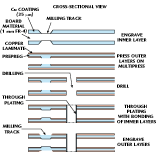 Until now fabricating prototype multilayer PCBs has been a costly and time-consuming endeavor. Although single-layer prototype boards traditionally are constructed in house, designers have been forced to go to outside shops for their prototype multilayer PCBs. A new tabletop multilayer press for rapid PCB prototyping has been developed that permits these multilayer designs to be fabricated in the engineering lab for rapid evaluation. The MultiPress II multilayer press is extremely cost effective and specifically designed for use with circuit board plotters such as the ProtoMat® series plotter. The system easily operates in an engineering environment as a result of its compact size and safety-oriented design. The new press permits lab personnel to laminate multilayer PCBs up to six layers using all of the common multilayer materials currently available, including specialized microwave prepregs such as the new Rogers RO4403 material. The MultiPress II unit is also capable of handling board sizes up to 10" x 12" with a required pressure of 100 N/cm2 , resulting in a force of 15 t (for a gross pressing area of 16.5" x 14.1").
Until now fabricating prototype multilayer PCBs has been a costly and time-consuming endeavor. Although single-layer prototype boards traditionally are constructed in house, designers have been forced to go to outside shops for their prototype multilayer PCBs. A new tabletop multilayer press for rapid PCB prototyping has been developed that permits these multilayer designs to be fabricated in the engineering lab for rapid evaluation. The MultiPress II multilayer press is extremely cost effective and specifically designed for use with circuit board plotters such as the ProtoMat® series plotter. The system easily operates in an engineering environment as a result of its compact size and safety-oriented design. The new press permits lab personnel to laminate multilayer PCBs up to six layers using all of the common multilayer materials currently available, including specialized microwave prepregs such as the new Rogers RO4403 material. The MultiPress II unit is also capable of handling board sizes up to 10" x 12" with a required pressure of 100 N/cm2 , resulting in a force of 15 t (for a gross pressing area of 16.5" x 14.1").
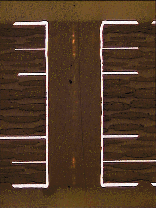 The MultiPress II unit is completely microprocessor controlled and features fully automatic operation. All of the important parameters, such as board size, pre- and main pressure, and pressing time for all individual process phases, can be programmed according to the specific material requirements and are automatically monitored. In addition, the new press laminates instant solder mask on any PCB prototype, an extremely useful feature when using fine pitch surface-mount technology or chip-on-board or ball-grid array components. Up to four processing programs composed of time, pressure and temperature parameters may be stored in the system for repeat use. When used with a ProtoMat circuit board plotter and MiniContac® electroplating tank, the MultiPress II unit requires only a few hours to produce complete multilayer prototype PCBs in the lab.
The MultiPress II unit is completely microprocessor controlled and features fully automatic operation. All of the important parameters, such as board size, pre- and main pressure, and pressing time for all individual process phases, can be programmed according to the specific material requirements and are automatically monitored. In addition, the new press laminates instant solder mask on any PCB prototype, an extremely useful feature when using fine pitch surface-mount technology or chip-on-board or ball-grid array components. Up to four processing programs composed of time, pressure and temperature parameters may be stored in the system for repeat use. When used with a ProtoMat circuit board plotter and MiniContac® electroplating tank, the MultiPress II unit requires only a few hours to produce complete multilayer prototype PCBs in the lab.
The Processing Method
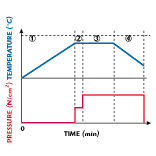 The fabrication process used to produce a typical multilayer prototype board involves five steps, as shown in Figure 1 . The first step is to engrave layers 2 and 3 of the double-sided FR-4 laminate using the circuit board plotter. Next, the outer layers (1 and 4) are laminated using the press. The PCB is left to cure a minimum of two hours, then the board is drilled using the circuit plotter. Next, the through holes in the PCB are electroplated using the Contac or MiniContac electroplating tank. (This process creates the interlayer electrical connections.) Finally, the outer layers are engraved using the appropriate artwork, and the multilayer board is ready for assembling. Figure 2 shows a cross section of a plated through hole in a six-layer PCB fabricated using this process.
The fabrication process used to produce a typical multilayer prototype board involves five steps, as shown in Figure 1 . The first step is to engrave layers 2 and 3 of the double-sided FR-4 laminate using the circuit board plotter. Next, the outer layers (1 and 4) are laminated using the press. The PCB is left to cure a minimum of two hours, then the board is drilled using the circuit plotter. Next, the through holes in the PCB are electroplated using the Contac or MiniContac electroplating tank. (This process creates the interlayer electrical connections.) Finally, the outer layers are engraved using the appropriate artwork, and the multilayer board is ready for assembling. Figure 2 shows a cross section of a plated through hole in a six-layer PCB fabricated using this process.
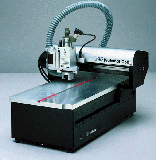 The MultiPress II unit features a footprint of approximately 0.25 m2 (1 m2 with a bench) and a weight of approximately 210 kg. The unit requires a 230 V/10 A or 115 V/20 A AC supply and a compressed air source of 6 to 8 bar at 30 in3 /min. The maximum processing temperature is 210ºC. The duration of the press process after preheating is approximately 90 minutes plus a two-hour cure time before drilling. Figure 3 shows the temperature/pressure/time profile used by the press for lamination. The associated ProtoMat circuit board plotter and MiniContac electroplating tank are shown in Figures 4 and 5 , respectively.
The MultiPress II unit features a footprint of approximately 0.25 m2 (1 m2 with a bench) and a weight of approximately 210 kg. The unit requires a 230 V/10 A or 115 V/20 A AC supply and a compressed air source of 6 to 8 bar at 30 in3 /min. The maximum processing temperature is 210ºC. The duration of the press process after preheating is approximately 90 minutes plus a two-hour cure time before drilling. Figure 3 shows the temperature/pressure/time profile used by the press for lamination. The associated ProtoMat circuit board plotter and MiniContac electroplating tank are shown in Figures 4 and 5 , respectively.
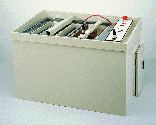 Short-run and prototype multilayer PCBs now may be fabricated in the engineering lab, saving both time and money. The new MultiPress II compact multilayer press brings one of the last remaining design steps in house without compromising the quality or reliability of the PCB.
Short-run and prototype multilayer PCBs now may be fabricated in the engineering lab, saving both time and money. The new MultiPress II compact multilayer press brings one of the last remaining design steps in house without compromising the quality or reliability of the PCB.
LPKF Laser & Electronics, USA, Wilsonville, OR (800) 345-5753 or (503) 454-4203.
